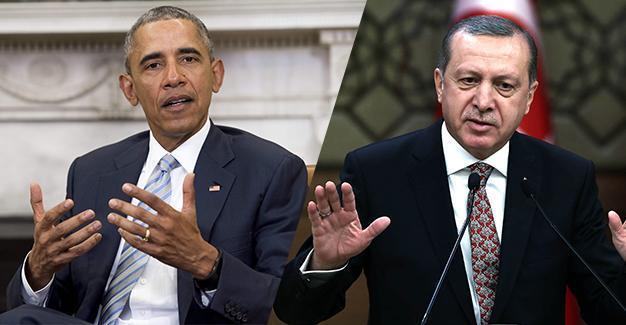Erdoğan to Obama: Turkey to stop shelling YPG only if YPG, Russia, Assad abide by Munich deal
Deniz Zeyrek - ANKARA
 The fall of the town of Azez in northern Aleppo province where the Turkish military is pushing ahead with its cross-border artillery shelling campaign against U.S.-backed Syrian Kurdish militia positions in Syria would mean emergence of a new refugee influx and security problem for Turkey, Turkish President Recep Tayyip Erdoğan told his U.S. counterpart, President Barack Obama. The People’s Protection Units (YPG), the militia force of Syria’s Democratic Union Party (PYD), and the Assad forces backed by Russia have been acting in cooperation, Erdoğan told Obama in an 80-minute telephone call on Feb. 19.
The fall of the town of Azez in northern Aleppo province where the Turkish military is pushing ahead with its cross-border artillery shelling campaign against U.S.-backed Syrian Kurdish militia positions in Syria would mean emergence of a new refugee influx and security problem for Turkey, Turkish President Recep Tayyip Erdoğan told his U.S. counterpart, President Barack Obama. The People’s Protection Units (YPG), the militia force of Syria’s Democratic Union Party (PYD), and the Assad forces backed by Russia have been acting in cooperation, Erdoğan told Obama in an 80-minute telephone call on Feb. 19.“Their goal is not fighting against ISIL [the Islamic State of Iraq and the Levant]. If Azez falls, Turkey will face a serious migration and security problem. If [Syrian President Bashar al-] Assad, Russia and the YPG abide by the agreement reached in Munich, then artillery fires will be ceased,” Erdoğan responded, when Obama reiterated the U.S. call for the Turkish Armed Forces’ (TSK) shelling of campaign of the YPG to stop.
The Turkish president was referring to a Feb. 12 deal reached by the 17-nation International Syria Support Group (ISSG) in Munich where many of the key actors in the Syrian conflict, including Damascus ally Russia, agreed on a proposed ceasefire and to increase humanitarian access.
Turkey will not let the continued building of a “corridor” south of its borders, Erdoğan said.
“Our artillery fires have this aim and will continue. We will never sit back and watch formation of such an illegitimate entity at our borders,” he told Obama, according Hürriyet reports citing sources from the Turkish president’s office and Turkish diplomatic sources.
As Obama expressed his condolences to Erdoğan over a Feb. 17 suicide car bomb attack that killed 28 people, many of them soldiers, in the heart of the capital city of Ankara, Erdoğan reiterated that they had “no doubt” that the YPG carried out the attack. As of Feb. 19, the Kurdistan Freedom Hawks (TAK), a group that once had links to the outlawed Kurdistan Workers’ Party (PKK), claimed responsibility for the bombing.
President asks for unconditional US support against YPG
Calling on the United States to give unconditional support in the fight against Syrian Kurdish militants, Turkish Prime Minister Ahmet Davutoğlu said on Feb. 20 he did not rule out the responsibility of the YPG, calling TAK a “proxy” that claimed the bombing to shield the international reputation of the YPG.
The YPG’s political arm has denied the group was behind the Ankara attack and said Turkey was using the bombing to justify an escalation in fighting in northern Syria.
“The only thing we expect from our U.S. ally is to support Turkey with no ifs or buts,” Davutoğlu told a news conference following a five-hour security meeting with members of his cabinet and other officials.
“If 28 Turkish lives have been claimed through a terrorist attack, we can only expect them to say any threat against Turkey is a threat against them,” he said.
Turkish Foreign Minister Mevlut Cavuşoğlu earlier accused the United States of making conflicting statements about the militia group.
Cavuşoğlu has also claimed that U.S. Secretary of State John Kerry told him the YPG could not be trusted, in what Cavuşoğlu said was a departure from Washington’s official position.
“My friend Kerry said the YPG cannot be trusted,” Cavuşoğlu said at a news conference during a visit to Tbilisi on Feb. 19, referring to call with Kerry that took place on Feb. 18.
“When you look at some statements coming from America, conflicting and confused statements are still coming.... We were glad to hear from John Kerry yesterday that his views on the YPG have partly changed.”
As of Feb. 20, Çavuoğlu held telephone conversations with both Kerry and Saudi Foreign Minister Abdel al-Jubair, Turkish diplomatic sources told Hürriyet Daily News on Feb. 21, without elaborating on content of talks or on who initiated the talks.
There were two fundamental differences between readouts released by the White House and Erdoğan’s office following the call.
The Turkish president’s office said, “Obama expressed concern over advance of the Syrian regime and the YPG in northwest Syria,” while the White House said, “Obama expressed concern about recent Syrian regime advances in northwest Syria.”
“President Obama stressed that YPG forces should not seek to exploit circumstances in this area to seize additional territory, and urged Turkey to show reciprocal restraint by ceasing artillery strikes in the area,” the White House said. But the Turkish side’s version didn’t include second part of this sentence on Obama’s call to Turkey.
According to the Turkish side’s readout, “Obama underlined Turkey’s legitimate right to self-defense, while expressing the unwavering commitment of the United States to support Turkey’s national security as a NATO ally.”
Yet, White House readout didn’t cite “Turkey’s legitimate right to self-defense,” instead stating, “He [Obama] emphasized the unwavering commitment of the United States to Turkey’s national security as a NATO Ally.”
A senior Turkish official speaking with Hürriyet said the Turkish side released the agreed readout; however, the White house released it after making two critical changes. The White House informed Ankara of the changes only after releasing the readout, the official said.
















